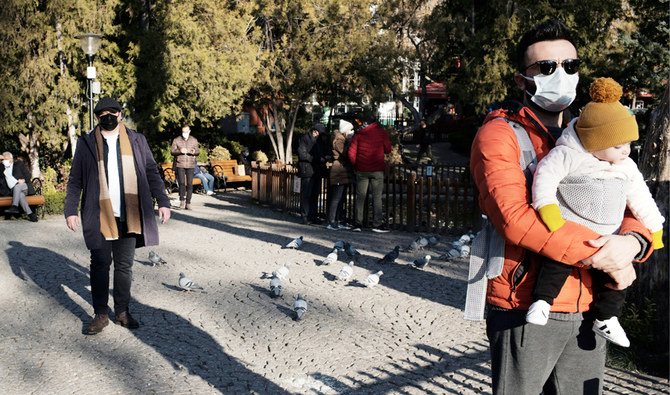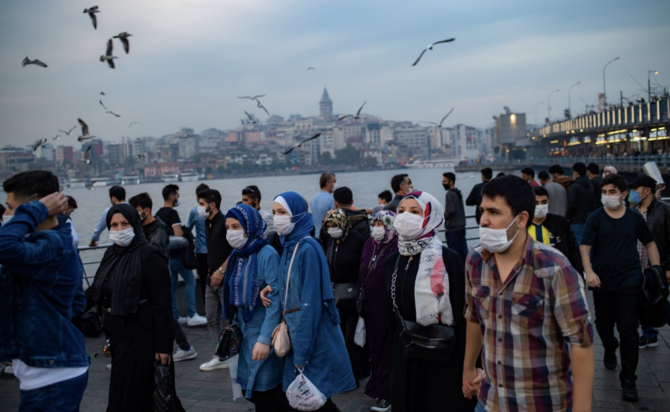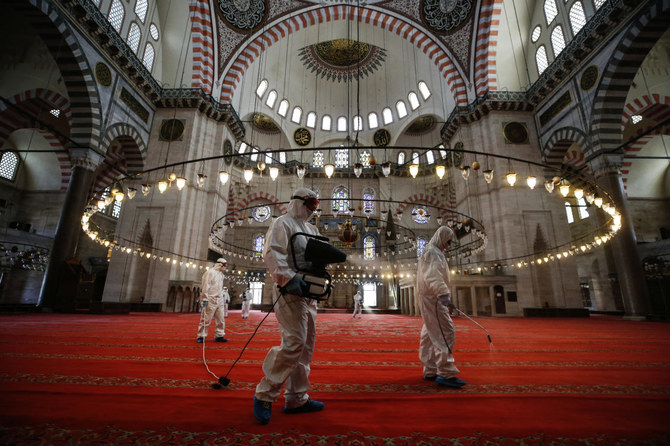ANKARA: The death toll from the COVID-19 pandemic in Turkey has risen for the sixth day in a row and alarm bells are ringing about the capacity of intensive care units across the country to cope.
“Don’t leave your houses this week. We have to be on alert,” Ismail Cinel, the head of the Turkish Society of Intensive Care, warned on Saturday as daily death rates hit a record high for the sixth consecutive day.
Official data from the Health Ministry showed 182 fatalities and 30,103 coronavirus infections in just 24 hours, including asymptomatic ones according to the recently updated counting method used since Nov. 25. The country previously only reported symptomatic cases.
With the new tally, the country suddenly became one of the worst-affected countries on a global level while it was among the least-hit ones four days ago.
The Turkish Medical Association has warned for a long time that the government’s previous count was not displaying the true scale of the contagion, and the medical group estimates there are more than 50,000 new daily cases, far higher than the official figures.
According to Dr. Ergin Kocyildirim, a pediatric cardiothoracic surgeon and an assistant professor in the department of cardiothoracic surgery at the University of Pittsburgh’s School of Medicine, the decision to change how cases were reported was not related to the World Health Organization’s joint vaccine distribution program as Turkey does not fit the requirements in terms of gross national income per capita.
“Over the summer Turkey had financial difficulties continuing the lockdown precautions so this forced the government to reopen the economy,” he told Arab News, speaking about the previous method of counting only symptomatic cases.
Kocyildirim does not believe in the transparency of sharing data during the outbreak in Turkey.
“And now Health Minister Fahrettin Koca has promised a free vaccination program. It is clear that Turkey has a management problem in terms of mass distribution projects. Mask distribution became quite a big problem followed by the start of the seasonal flu vaccination program,” he said.
In a much-anticipated move from the scientific world and opposition politicians who were claiming that decisions were taken politically, President Recep Tayyip Erdogan finally left the responsibility with the country’s coronavirus scientific advisory board for deciding which measures will be taken in the fight against the worsening pandemic.
“The primary responsibility about the new measures belongs to the scientific advisory board,” he said.
Turkey announced last week new measures to fight the virus, including a partial curfew on weekends from 8 p.m. to 10 a.m.
But the measures were deemed to not go far enough by medical groups concerned about the exhaustion in the Turkish health system fighting the outbreak.
“The course of the pandemic has been interesting in Turkey,” Dr. Mehmet Adin, from Yale University, told Arab News.
“Initially, like everyone else, I thought we were doing a great job. Over the course of the pandemic, particularly in the late summer, alarm bells were ringing so loud. We could have acted upon this, but I think we failed to a large extent.”
According to Adin, frontline staff have been working extraordinarily hard across the country, but this was not enough when dealing with a massive public health problem.
“Policy implementations since early summer were rather loose. The health minister was at the forefront of the war against the virus. The coronavirus task force, the so-called scientific advisory board, fell short, complaining of ‘not knowing the real case numbers,’ although I believe this should not be an excuse,” he said.
Adin said that there was no need to hear the real numbers from officials in an era of massive data flow and communication.
“I, from thousands of miles away, was able to see where it was going. I think the taskforce also fell short of catching up with evolving practices across the scientific community and literature. For example, Plaquenil, an anti-malaria drug that has long been shown to be ineffective in all forms of COVID-19, if not potentially hazardous, is still in use,” he said.
In the meantime, the number of seriously ill patients and fatalities is also increasing, while cities such as Istanbul are facing their “third peak.”
“You can change reality by your actions, but it is very hard to do so by your rhetoric,” Adin said, adding that evidence-based policy implementation was required when dealing with a pandemic.
“We know from our experience that one needs to act fast and know that every minute counts. All public measures, lockdowns and policies need to be implemented based on regional numbers and scientific evidence. Given the partial lockdowns and age-specific curfews, about which I have doubts about their effectiveness, the primary goal seems to be mitigation,” he said.
According to Adin, the Turkish government cannot put out a fire by extinguishing it partially — or fighting it at night and then letting the fire explode during the day.
“You need to fight consistently and reasonably if you want to distinguish this fire. The virus is not going anywhere, and obviously herd immunity is a utopia until there is nationwide vaccine deployment,” he said.


















